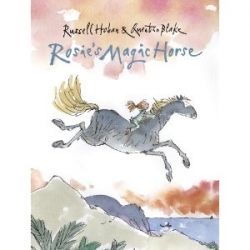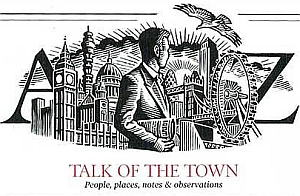My journey was over, all bar the shouting; now all I had to do was get home. I’d deliberately made Tower Hill my last stop so I could catch a District Line Tube directly to Richmond. I crossed the road from All Hallows and staggered to Tower Hill station, outside which a group of tourists were being taken on some kind of guided tour. I wished I’d had the energy to tag along, but it was no use – I had to put my feet up and get home, in that order. A Richmond train arrived at the platform almost immediately I descended into the station and I sank into a seat like someone three times my age. I flicked through a copy of the Evening Standard someone had left on the seat, whose headline told a tragic story of a promising American artist who’d been murdered that morning while she jogged in Hackney. The news made the “Birdwood” exhibition of platform sculptures at Gloucester Road all the more poignant. Opposite my seat, squeezed again between more adverts for mortgages and travel insurance, was another of the Poems on the Tube, this one “Bonnard” by Elizabeth Jennings. I inserted the quote from Angelica’s Grotto in a random page of the Standard which I then left on the seat next to me; technically the train wasn’t going to Fulham, but it was on the right lines – the District Line, to be precise, which is something akin to an actor who makes cameo appearances in almost all of Russell Hoban’s books. The line itself takes in a great swathe of London, from the affluent suburbs of Richmond, Fulham and Wimbledon in the west to the less exclusive towns of Plaistow and Upminster in the east, all of it via Westminster, Victoria, Sloane Square and of course Monument and Tower Hill in the City. The Wimbledon branch of the line itself runs directly past Russ’s window in Fulham, as it does the windows of many of his characters. I might be a “west Londoner” but whenever I’m on the line I like to look up at the map and say the names of some of the east London and Essex stops to myself: “Dagenham Heathway”, like the name of a thriller writer; “Stepney Green”, a prime candidate for a regular in the house band at Ronnie Scott’s; “Bromley-by-Bow” was Bromley Bybow, a character from a fictional landscape somewhere between P.G. Wodehouse and J.R.R. Tolkien. And Upminster – Lord Upminster to you, guv; another of my favourite people, the late, great songwriter and professional geezer Ian Dury. I often dreamt of him acting in a dramatised version of one of Russ’s novels; sadly that won’t happen now.
As the train approached Richmond and my last stop of the day, I thought again about Russ’s visit to the Old Town Hall there on 22nd November 1999 for a reading from Angelica’s Grotto. I remember the precise date because I bought a copy of the book and he signed it for me TO RICHARD COOPER, BEST WISHES FROM RUSS HOBAN 22-11-99. It was the first time I’d met him and I’m glad it wasn’t the last. Criminally, there weren’t many people at the reading, but I was there with my dad, a big fan of The Medusa Frequency via the writings on mythology by Jung and Joseph Campbell, and two friends who were also admirers. I felt a bit inferior to them at the time because they’d read Riddley Walker and I hadn’t, but I made up for this transgression fairly quickly after the reading. Russ was dressed all in black except for a multi-coloured knitted waistcoat. It was very funny to see him, a short man of seventy-three with a small beard and no moustache, standing at the lectern and reading with a perfect deadpan expression the description of Harold Klein from the first page, “He was a small man of seventy-two with a small beard, no moustache”. He read the first few chapters and then excerpts from later chapters, prior to taking questions from the audience. Before he did this he swapped his reading glasses for his lissening glasses, a pair with tiny microphones attached to the arms. He talked about his writing technique of “constantly returning to page one”, which we agreed later must have required the patience of a saint. I asked him how he knew when one of his ideas was going to become a novel: “If I can write fifty pages, I see if I can take it up to a hundred pages,” he said, “and then I see if I can take that up to a hundred and fifty pages and so on.” It sounded a wonderfully simple technique for books of such “controlled complexity”. One of my friends asked him quite a lot of questions, among them “Do you feel deracinated when you’re not writing?” to which Russ replied, “When I’m not writing, I simply feel ill.” This got a big laugh and the question and answer session was rapidly terminated by the host from Richmond Council’s arts department who said, “I think considering that Russell does, as he says, share several of Harold Klein’s infirmities, we ought to give him a rest. Thank you very much.”
The train drew in at Richmond and I prepared myself for the last haul, a ten minute walk home. Before I alighted I dropped the last quote of the day on a seat by the door:
Outside Richmond Station a bus was just about to depart but I didn’t have the energy to make a run for it. I staggered down the high street, past the Old Town Hall and over Richmond Bridge, dreaming of another glass of wine and a hot bath the way men who’ve been crawling across the desert fantasise about a glass of water. And when I finally got home, I found, stacked against the front door in what could be described as either Jungian synchronicity or a Pythonesque joke, four copies of nothing less than the new edition of... the Yellow Pages.
No, really.







 On 4 February 2012 the Slickman A4 Quotation Event celebrated
On 4 February 2012 the Slickman A4 Quotation Event celebrated 


 In 2005 the first international convention for Russell Hoban fans took place in London, and was marked by the publication of a fantastic 48-page booklet featuring exclusive contributions from innumerable fans and associates including novelist David Mitchell and actress Glenda Jackson. A wonderful memento of the event, it's also a beautiful collector's item and must-have for any Hoban fan. Although in limited supply, copies of the booklet are still available at £6.00 each plus p&p. Order direct from
In 2005 the first international convention for Russell Hoban fans took place in London, and was marked by the publication of a fantastic 48-page booklet featuring exclusive contributions from innumerable fans and associates including novelist David Mitchell and actress Glenda Jackson. A wonderful memento of the event, it's also a beautiful collector's item and must-have for any Hoban fan. Although in limited supply, copies of the booklet are still available at £6.00 each plus p&p. Order direct from  Russell Hoban turned 86 on 4 February 2011 and fans celebrated in traditional style by leaving quotes from his books in public places. Browse their quotes
Russell Hoban turned 86 on 4 February 2011 and fans celebrated in traditional style by leaving quotes from his books in public places. Browse their quotes  To celebrate 30 years in print of Russell Hoban's most famous novel
To celebrate 30 years in print of Russell Hoban's most famous novel 






Fabulous to read all this again in 2012! RPC
ReplyDelete